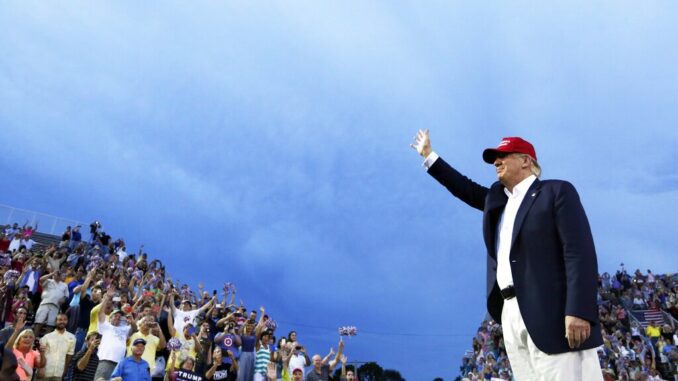
As the Republican presidential primary intensifies this summer, most White House hopefuls are devoting their time to events in Iowa and New Hampshire, the states that kick off the nomination process early next year. Not Ron DeSantis or Donald Trump.
The Florida governor addressed more than 1,500 faithful Republicans on Saturday at Nashville’s Music City Center. A few weeks later, the former president will swing through Alabama to headline the state GOP’s biggest event of the summer.
Trump, the early GOP frontrunner, and DeSantis, who is trailing him for second place, are hardly ignoring voters in the states that jumpstart the Republican contest. Over the past month, they’ve both held rallies and other major events in Iowa, New Hampshire and South Carolina, sometimes even appearing in the same state on the same day.
But they are doing more than the other GOP candidates to strengthen their position in states like Tennessee and Alabama that will hold elections on so-called Super Tuesday. That’s when the largest number of delegates, which candidates win state-by-state, are up for grabs of any single day in the primary cycle.
Only Trump and DeSantis, who have raised tens of millions of dollars to support their campaigns, have the resources to work in any meaningful way beyond the early states. And GOP leaders beyond Iowa, New Hampshire and South Carolina say it’s a smart strategy.
“I know everybody’s focused on Iowa and New Hampshire,” said Scott Golden, chairman of the Tennessee GOP, who noted that early voting in his state begins in mid-February, before South Carolina is scheduled to hold its contest. “But it is worth taking a little time out to come to Tennessee.”
For presidential candidates, Super Tuesday is a circled-in-red date — next year, it’s March 5 — that can make or break a campaign.
Coming quickly after contests in early states such as Iowa and New Hampshire, the set of roughly 14 primaries are held across a broad geographic area, from California and Texas to Massachusetts and Maine. The day also is a test of a campaign’s ability to organize supporters, its financial strength and a chance for those candidates who are still standing to run up their delegate total.
In 2016, for example, Trump’s Super Tuesday dominance signaled, against conventional political wisdom, that the businessman and reality TV star was likely to be the party’s nominee. President Joe Biden similarly romped through Super Tuesday in 2020, quickly forcing most of his remaining rivals to drop out.
This cycle, Trump and DeSantis have been nailing down key endorsements in Super Tuesday states, starting to hire staff and readying supporters to knock on doors.
Of course, targeting Super Tuesday states is no guarantee for winning the nomination. After a late entry in the 2020 Democratic presidential race, billionaire Mike Bloomberg’s strategy was to bypass early contests and win in Super Tuesday states. The former New York mayor spent over $500 million but finished well behind Biden in the delegate haul.
Trump formally entered the race with the huge advantage of having run and won races in these states before, and his campaigning in many of them hasn’t stopped since he lost the 2020 election. In 2021, for example, Trump held a “Save America” rally in Alabama that the state GOP said drew some 50,000 people.
“People of Alabama have a special relationship with Donald Trump,” said Alabama Republican Party Chairman John Wahl, noting Trump handily won the GOP primary in 2016, when he was battling Sens. Ted Cruz of Texas and Marco Rubio of Florida for the nomination. Trump also won the general election in Alabama easily in 2016 and 2020.
“It’s states like Alabama that are going to be where (Trump) hopes to make a lot of ground,” he said. “And if other candidates are going to beat him, they have to compete with him in those states.”
DeSantis and Never Back Down, the super PAC supporting him, are trying. The PAC plans to invest $100 million on ground operations targeting the first 18 states — four early states plus Super Tuesday states — including paid staff such as state campaign directors. Door knocking is well underway in the first states and will start in Super Tuesday states this summer, with a goal of having 2,600 people out supporting the Florida governor by Labor Day.
“Nobody else is doing what we’re doing as of this point,” spokeswoman Erin Perrine said.



